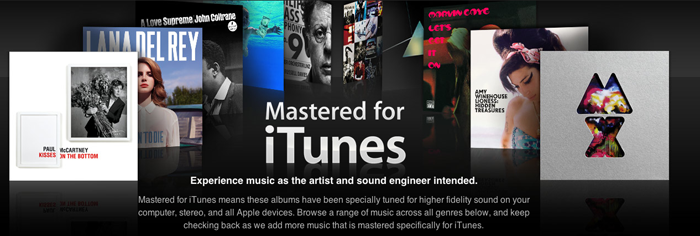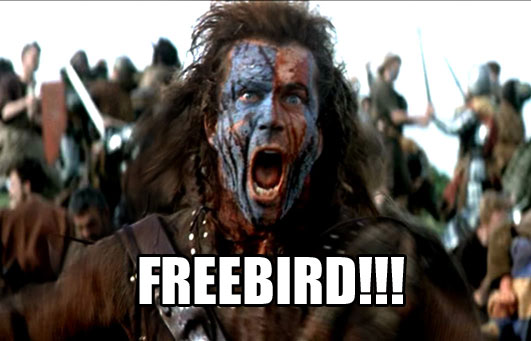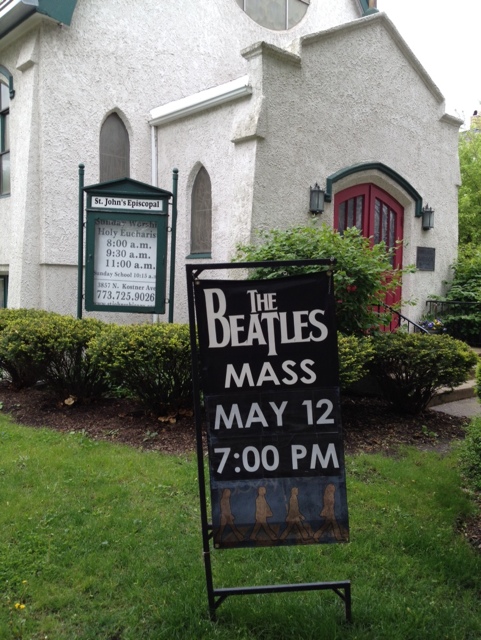My brother-in-law sent me this via text message. It’s good to see a church not holding a grudge from the whole “bigger than Jesus” thing. (Here’s a link to the church in question.)
Post Category → Blog
I’m Like, I Said
Or, In Defense of a Much-Loathed Linguistic Trend
So I was talking to my boss the other day and I was like, “Does anyone know what they’re doing on this project?†And he was like, “I wish.â€
Now, what did I just say there?
People have been lamenting the decline of the verb to say for a surprisingly long time — at least as long as I’ve been around, which is enough. When I was growing up, the culprit was goes:
“So he goes, ‘What are you doing this weekend,’ and I go, ‘Going to a stupid family reunion’.â€
I never liked goes very much. As a writerly type, I always felt an obligation to speak properly, whatever that meant, and to not give in to imprecision, trends, laziness or other bad linguistic habits. (That doesn’t mean I correct other people when they do it, but that’s for another post.) In college I took some linguistics courses — well, all of two, but it didn’t take much to change the way I think about language. The thing that struck me most was the distinction linguists make between being descriptive and prescriptive. As far as I had always known, as far as I had ever been taught, the only relevant issues concerning writing, speaking and language related to what you should do. Don’t end a sentence with a preposition. (Actually, it’s OK to do that.) Avoid double negatives. Make positive statements rather than negative ones (“I forgot†versus “I didn’t rememberâ€). It hadn’t really occurred to me that it was possible to take a different stance: that of the impartial observer, dissecting the ways in which people bend and shape the language to suit their needs, just as they’ve been doing ever since they started talking. Continue reading
Welcome to the Hamster Hotel

Reading blurrpy.com earlier this week, I came upon a link to a most wondrous thing. Some design firm called O*GE Creative (the asterisk adds a lovely note of pretension, don’t you find?) created a giant, human-habitable bird nest:
 The giant birds’ nest was created “as a prototype for new and inspiring socializing space, which can be seen as a morph of furniture and playground … Ready to to be used, to be played in, and be worked in.” I think it’s a marvelous idea, and one I am certain to have in my house, once I win the lottery and begin establishing my network of seasonal homes across the globe. But a work space? The thought of clambering into this thing with my colleagues to discuss our latest projects gives me the heebies. It would feel way too much like climbing into bed and I really want to stop thinking about it. Besides, I sometimes have a terrible time staying awake in meetings, and nestling into this, well, nest would be like mainlining an Ambien drip straight into my cerebellum, or whatever part of the brain gives me that happy tired feeling at the end of the day.
The giant birds’ nest was created “as a prototype for new and inspiring socializing space, which can be seen as a morph of furniture and playground … Ready to to be used, to be played in, and be worked in.” I think it’s a marvelous idea, and one I am certain to have in my house, once I win the lottery and begin establishing my network of seasonal homes across the globe. But a work space? The thought of clambering into this thing with my colleagues to discuss our latest projects gives me the heebies. It would feel way too much like climbing into bed and I really want to stop thinking about it. Besides, I sometimes have a terrible time staying awake in meetings, and nestling into this, well, nest would be like mainlining an Ambien drip straight into my cerebellum, or whatever part of the brain gives me that happy tired feeling at the end of the day.
So I won’t be pushing to have the giant birds’ nest installed in our office anytime soon. But it did remind me of an idea I had a long time ago that I can’t seem to let go of. It concerns hamsters. Continue reading
And All That You Hear: Mastered for iTunes
 Apple announced today a new service or product or category or something called Mastered for iTunes. You can see the thing for yourself in iTunes at this link courtesy of The Mac Observer; here is the description from Apple if you don’t want to bother reading it there:
Apple announced today a new service or product or category or something called Mastered for iTunes. You can see the thing for yourself in iTunes at this link courtesy of The Mac Observer; here is the description from Apple if you don’t want to bother reading it there:
Mastered for iTunes means these albums have been specially tuned for higher fidelity sound on your computer, stereo, and all Apple devices. Browse a range of music across all genres below, and keep checking back as we add more music that is mastered specifically for iTunes.
What this means is anyone’s guess, at least until people prod Apple for details and if Apple deigns to respond. Most likely they’re just compressing the tracks to make them sound louder and punchier. This would make them sound worse rather than better, especially on an iMac or a pair of pack-in iPod earbuds, but that does seem to be where modern tastes have landed us. I don’t suppose I will ever know, as I’m not going to re-buy any of my (relative few) iTunes purchases to compare old and new versions.
What caught my eye was the categories of music available in this new format. You have your Jazz, your Classical and whatnot. And then you have this:
 Tastes come and go, but any format meant to appeal to serious audiophiles has to have the Floyd catalog. One day, music players may be able to stream music directly into our brains, leveraging the mind’s extraordinary sensory powers to make you feel as though you are within and surrounded by the music, inhabiting it in every fiber of your being, every nerve ending ablaze with it. And no one will buy it until you can play Dark Side of the Moon in it.
Tastes come and go, but any format meant to appeal to serious audiophiles has to have the Floyd catalog. One day, music players may be able to stream music directly into our brains, leveraging the mind’s extraordinary sensory powers to make you feel as though you are within and surrounded by the music, inhabiting it in every fiber of your being, every nerve ending ablaze with it. And no one will buy it until you can play Dark Side of the Moon in it.
Edited the title to improve the Floyd reference. I can’t believe I got that wrong.
They May Take Our Lives, But They’ll Never Take Our Freebird
 Today on Popdose I published a piece making fun of people who yell “Freebird” at concerts. (I know, I know. Tomorrow I’m going to write a piece making fun of airline food.) I don’t usually post links to stuff I write on other websites, but I wanted an excuse to use the above graphic. I created it to go with the story but ended up using another one, and didn’t want this one to go to waste. It kind of freaks me out, truthfully. Don’t look at it too long.
Today on Popdose I published a piece making fun of people who yell “Freebird” at concerts. (I know, I know. Tomorrow I’m going to write a piece making fun of airline food.) I don’t usually post links to stuff I write on other websites, but I wanted an excuse to use the above graphic. I created it to go with the story but ended up using another one, and didn’t want this one to go to waste. It kind of freaks me out, truthfully. Don’t look at it too long.
Check out the piece here.
Lordy Lordy.
I am 40 years old today.
When I was growing up, 40 was the official over-the-hill birthday. A 40th birthday party involved novelty canes, ear trumpets, black armbands, walkers and other unfunny, made-to-be-thrown-away crap that occupied a dedicated shelf at Spencer’s Gifts. It still does, somewhat, but as I’ve aged I’ve noticed that culturally, we have tacitly agreed to move back the point beyond which “it’s all downhill from here.” As more Baby Boomers edge closer to the abyss, we have grown less willing to draw the line at which we must admit to ourselves that we are, finally, old.
I am a bit unsure of what to make of it all. Statistically, the odds are that my life is more than half over. When I think of all the things I would like to have done by this age – mostly involving writing and traveling, neither of which I’ve done to anything like the extent I once hoped – I am torn between two competing realizations: that youthful dreams rarely come true and mostly aren’t even meant to, and that I have squandered too much of the only existence I will ever have.
How badly should I feel that I have never lived abroad (well, apart from that semester in college), written a novel or been to Italy? That I work in the corporate world and have often substituted workplace ambition for personal or artistic goals? Is there any point in regretting the many mistakes I’ve made — situations where I sacrificed my happiness for someone else, gave into fear and laziness or knowingly made a bad decision to spare someone’s feelings?
I tell myself that any mistake is worth making as long as I learn from it. I tell myself that it is never too late to do the things that matter to me: to live in a place I don’t know, to use my talents for my own ambitions rather than for my bosses’, to live a life I will be grateful for once it’s over. I think these are valid views — but I would, wouldn’t I?
Shortly before he died, Christopher Hitchens said, “You have to choose your future regrets.” We can never fulfill all our dreams — not if our dreams are worth the name. I haven’t fulfilled all that many of mine. But I do have a beautiful, intelligent and fantastically talented woman to share my life with; reasonably good health; and that persistent, nagging urge to do something more than show up to a job every day — to make something lasting that reflects who I am.
Yes, I wish I had more time ahead of me. But do I wish I were younger? Not a chance. What wisdom I have has been very dearly bought. I wouldn’t rather be anywhere else than where I am today.
Happy birthday? Why, yes it is, thank you.

